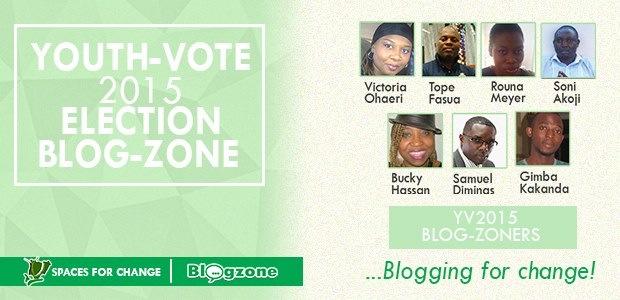[vc_row][vc_column][vc_column_text]
Every Monday, the YV2015 Election Bloggers will publish weekly blog posts on THE CABLE – http://www.thecable.ng/- provoking new thoughts and fresh conversations around the 2015 elections. Because they are all bloggers, popular peer leaders, respected voices and online crowd-pullers, the bloggers will utilize their weekly communications to drive civic learning and rouse the political conscience of the nation as the election year approaches. They will capitalize on their digital capabilities and strong followership on the social media to deepen democratic participation and youth voter engagement ahead of the 2015 general elections.
[dt_gap height=”10″ /]
Who are the YV2015 Blog-zoners:
[dt_gap height=”10″ /]
Drawn from all of Nigeria’s vast geo-political units, YV2015 Blog-Zoners exploit the shifting landscape of media and communications in which youth are central actors, to provoke peer conversations and democratic debates grounded in actual contexts and local priorities of the youth populations across the country. They capitalize on the potential of the learning opportunities available through online resources and networks to provide rudimentary information that imbue voters with the knowledge and confidence to directly engage political office aspirants, demanding answers to hard questions that matter to the citizens especially the youth: how they will use oil revenues for job creation; tackle corruption in the oil sector; improve learning infrastructure and educational standards and bring about developmental and economic progress to all Nigerians.
Tope Fasua: An economist and author, Tope Fasua reflects on the myriad economic issues facing Nigeria and Africa at large from different, refreshing perspectives, with a view to proffering solutions, and alerting all stakeholders to their share of responsibilities during an election season.
Gimba Kakanda is a student of Nigeria, observing certain interpersonal relationships between the politicians and the electorates as the election year approaches. His blog addresses attempts to polarize the people along the lines of religious, ethnic and regional affiliations.
Ruona Agbroko-Meyer is an unashamedly avid voter, stopped only in the 1999 elections by age restrictions. She continues to advocate for the Diaspora Vote, but doesn’t mind traveling home for elections, in the interim. Her gender, profession and physical distance from Nigeria have conspired to ensure her blogs remain fixated on willful and unintentional disenfranchisement – by governments and the people.
Samuel Diminas, a petroleum geophysicist, strongly advocates that oil sector reforms are election campaign issues. His writings draw from a rich mix of his in-depth knowledge base of the Nigerian petroleum industry and practical experience from working in national and international oil corporations.
Soni Akoji, is a pharmacist and a left wing advocate of good governance.
Bucky Hassan is passionate about women, politics and Nigeria. Women’s disinterest in political discussions and activities bothers her so much. Through her blog, she wants to stir women’s interest in politics, and also examine how propaganda is successfully used as a tool by politicians, to create insecurity, breed disharmony, sway and shape minds, disrupt the electoral process, and manipulate voters into supporting candidates who consistently let the nation down.
Victoria Ibezim-Ohaeri loves to stir controversy by asking those hard questions no one likes to answer. She also believes that the young generation is at a unique historical moment to take advantage of new media tools and practices to embed systemic changes in Nigeria’s social, economic and political landscape. Hence, her blogs will examine the constellation of untapped opportunities for deepening democratic engagement, making clear that participation is a human rights imperative, as well as a priority for the development agenda.[/vc_column_text][/vc_column][/vc_row]




















